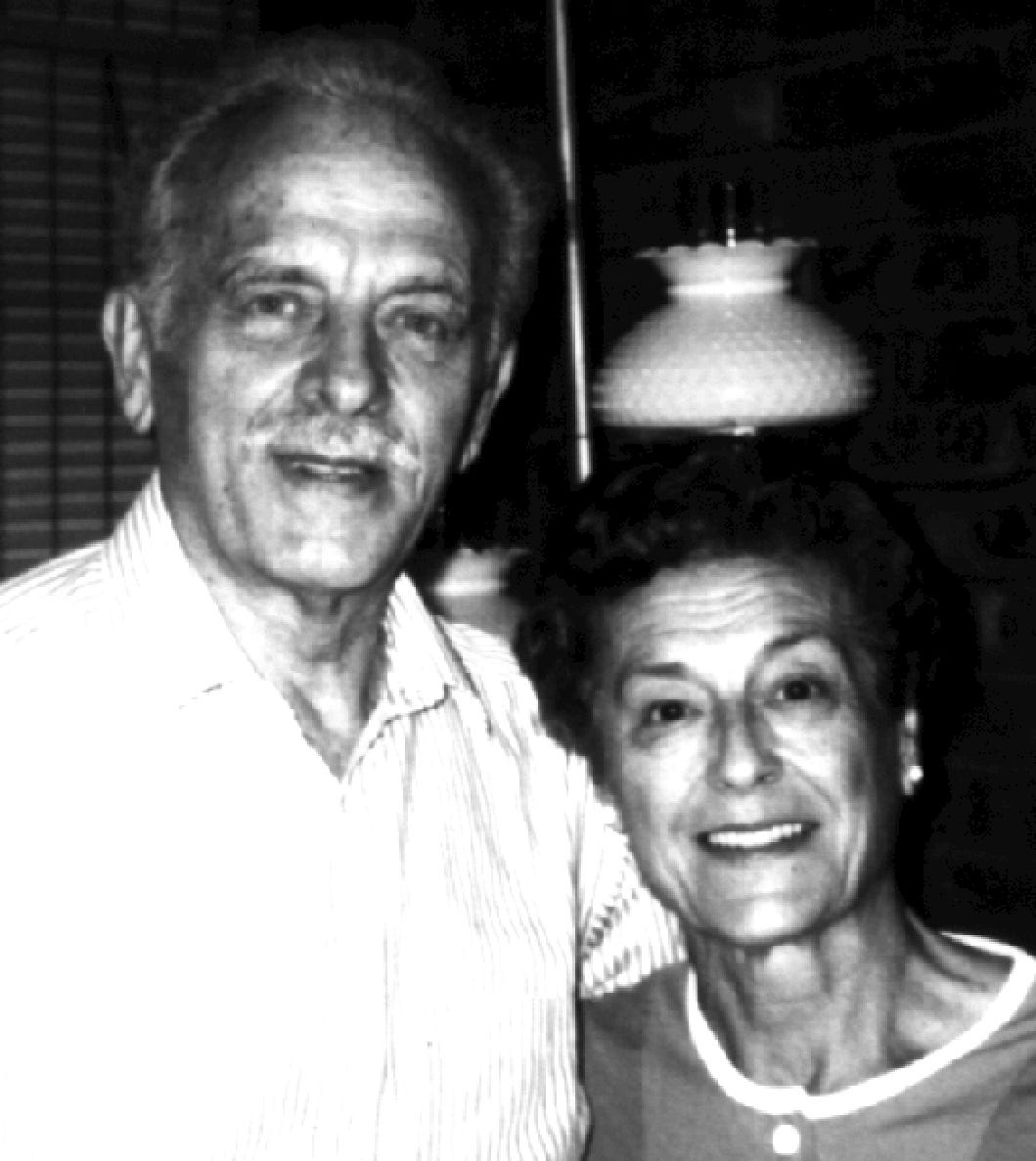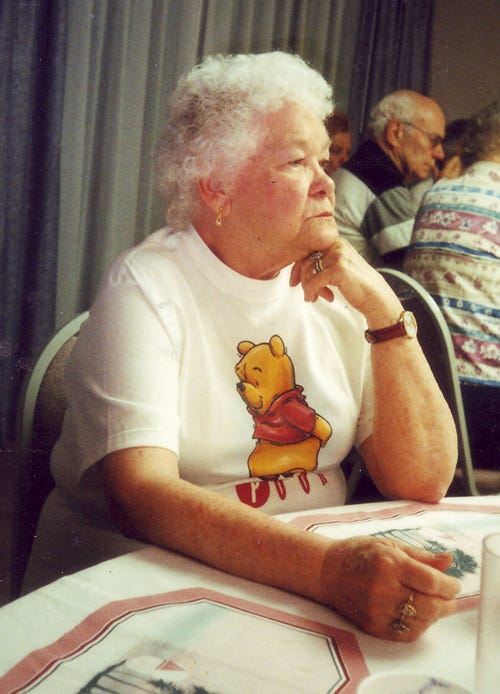Everything's Coming Up Rosie
Oral history keeps me riveted
Lou and Olga Putnoky
My friend Steve Parker saw my “Gold Star Mothers” Substack and figured he ought to invite me on his Saturday morning radio show on WTIC to talk about Women’s History Month, so I said I’d put some audio clips together that he could choose from to play on the air.
Going back to the third or fourth reunion I attended of my father’s tank battalion, around 1990, Helen Grottola, the wife of mechanic Joe Grottola, saw me with my tape recorder and asked me when I was going to start interviewing the women at the reunion.
“How about now?” I said.
Helen Grottola
One of the universal themes of the war that has interested me was how men who became fathers shortly before or after going overseas and had a child who was one and a half to three years old when they came home reacted. Major Forrest Dixon, for example, returned to his onion farm in Munith, Michigan and said his daughter, who was about four, told him to “go back to Germany.” She’d been sleeping in the bed with her mother, he said, and was not too happy about having to sleep in her own bed.
Forrest Dixon:
Helen Grottola had one of the most interesting takes on this mode of parenting. I don’t know how the audio clips play or if readers listen to them, so I’ll include a transcript with some but not all current and future clips.
Helen and Joe Grottola:
Joe Grottola: Our daughter’s older than you.
Helen: Oh yeah, our daughter’s 52 years old.
Aaron: Now, did she recognize you when you came home?
Helen: Ohhh, are you kidding? I never gave her a picture and said “This is your daddy. I would show her pictures and I would say “This is what your daddy looks like.” Which made the difference. My girlfriend made the mistake of saying “This is your daddy,” and giving the kid a picture. So that when his daddy walked in he grabbed the picture and said “My daddy! My daddy!” John’s heart was broken. But I told ours, “This is what your daddy looks like.” Every time she’d see a soldier it didn’t matter whether he was black, green, blue or purple, if he had on a uniform, “Daddy? Daddy?” “No, that’s not your daddy.” And I taught her one song, and when he hears it today he almost cries, “[It’s been a] Long, Long Time.” ([it’s been a long, long time)”
Joe: My daughter sang to me the day I came home.
Aaron: Did she really?
Helen: Yes she did. He got out of the car and she ran down those steps and tore out of my mother’s arms and screamed “My Daddy! My Daddy!” And she was four and a half years old.
Aaron: And she hadn’t seen you in three years?
Joe: Two and a half.
Olga and Lou Putnoky:
Lou Putnoky: During the war, you had one hundred percent censorship. Now Desert Storm, you didn't have it, because it's a different world. And I've often said to myself, we could never... (telephone rings. Lou’s wife, Olga answers, and tells Lou it’s one of his shipmates)
Olga Putnoky: This has been so funny, because Lou has been getting calls from all over the United States. And it is cute because, the best part of it is, in 48 years I've never been able to get him to go to Las Vegas, I've been dying to go. And he's been getting calls from all over the United States, and the conversation will start out, "Are you that tall, skinny, curly headed kid?" And Lou will say "Are you the redhead that I pitched the football to and fell off the dock," and so forth. It's the nicest thing, it's wonderful.
Aaron: How did you and Lou meet?
Olga: Lou and I lived in Carteret, and we belonged to the same church. I was, I think five years old and he was six, I was in the church play, and his mother and he were sitting in the first row. He said, "See that dark-haired girl? When she grows up I'm gonna marry her." And we went to different schools. I went to Woodbridge, and he went to Carteret. We started to date, nothing serious until after he got home from the service. We were friendly, and we did go to different schools, but we dated occasionally.
Aaron: And you have how many children?
Olga: We have two children. We have Bruce, he's 44, and Diane who's 40. Our son was born in 1950. He lives in Holmdel, and our daughter lives in Carteret, nice and close by. We'll be married 48 years in May. We just had four 50th anniversaries, our close friends. And our children were invited to all of them; they just could not get over it. Lou's parents were married over 70 years. His dad was 102 when he died. We had him for six years or so, taking care of him. Most of our friends have been married around the time we got married. Lou's buddy, his closest friend, his shipmate, he called this morning from Long Island, William Uhlendahl, we visit; we're godparents.
We do not live for just today, I think that's the thing of it. Today's youngsters live for today. I was at a checkout line of a supermarket a couple of years ago. There were two very pretty young girls, and one said to the checkout girl, "Well I hear you're getting married. What made you decide?"
She said, "Well, you know, if it doesn't work out, so I'll get rid of him." I was just shocked. I didn't say a word, I just listened, but what fools. Don't get married if you have that kind of an attitude. But we've just been very lucky, very, very lucky in our relationship. I guess we picked the right friends.
Aaron: Did you work in a defense plant?
Olga: I worked in U.S. Metals, I was the first girl hired in personnel. They hired me in '41, and I stayed on until '49.
Aaron: Did they make ammunition?
Olga: Oh, yes. They had, and our bosses used to go to New York, or North Carolina, South Carolina, Florida, to recruit labor. You know, all the boys and the men from around here were in the war, in the service, so they were a very big copper industry. We had the war bond rallies, it was really nice, everybody's attitude was, most of the women in town worked there, because the men were in the service. I have some pictures of the women who worked there. They had such an attitude, these nice, quiet old ladies, even the elderly women came to work, and they just put their noses to the grindstone and they worked. We had a lot of women during the war. And then slowly as the men came back they were replaced.
Evelyn and Don Knapp: “This was repeated millions of times.”
Don Knapp: I can remember Lieutenant Lombardi walking by talking to another lieutenant and saying, "Now if I get knocked off I want you to take this," and then he trailed off and I didn't hear the end of it, but he was getting a little punchy towards the end. Very jittery. But he still kept doing his job. It gets to people.
Aaron: Did you ever start thinking about mortality? Did you get like a fatalism?
Don: I wasn't a fatalist. No, I thought, gee, I want to get home to my Evelyn, and I'm gonna do the best I knew how. And I remember I got nicked a couple times, I should have went back for a Purple Heart, it would have been some points, but I said, "I don't want," poor little Evelyn was only 95 pounds and worried about me.
Aaron: Really?
DK: Yeah, oh, she was a skinny little thing.
Evelyn Knapp: When he went overseas I went down to 80 pounds.
Aaron: Go on. From worrying?
Evelyn: Missing him, and I don't know.
Aaron: Where did you live when he went overseas?
Evelyn: I went back and lived with my, well, we had a small apartment, a four-room apartment...
Don: Springfield, Massachusetts.
Evelyn: All the time he was in the service we kept that apartment, so when he'd come home on furlough we had our own place.
Don: It was $12 a month. We could afford it. Nice Irish lady let it to us cheap.
Evelyn: I'd stay in our little apartment, the next thing I know, somebody would be knocking at the door. It would be my father. "Mama wants you to come home." We only lived about six houses away. They didn't want me in my place alone because they knew I would be crying all the time. So I'd have to go home with Mama. So I stayed mostly with my mother.
Don: And you have to realize that this was repeated millions of times; we were not alone.
Aaron: Did you work at all?
Evelyn: Oh, yeah. I worked at Indian Motorcycle. See, he worked at Indian Motorcycle when he went in the service. So they told him if Evelyn wants a job, you brought me over and I got a job. So I worked at Indian Motorcycle until I started following him. When he got done with his basic training, then I went to Columbus.
Don: And to Louisville.
Evelyn: And then we went back home and then I worked.
Aaron: Did you have a child?
Evelyn: No, we didn't have our son till he was out of the service for quite a while.
Don: He's an engineer.
Evelyn: He's only 38 now, 37.
Don: We had trouble having kids, so we got blessed after a while.
Evelyn: We got lucky once. So you're in for it now, because you've got to look at our little grandchildren. You asked for it.




I love how you got these folks talking on a personal level. You have the knack! It's a real gift, honestly.